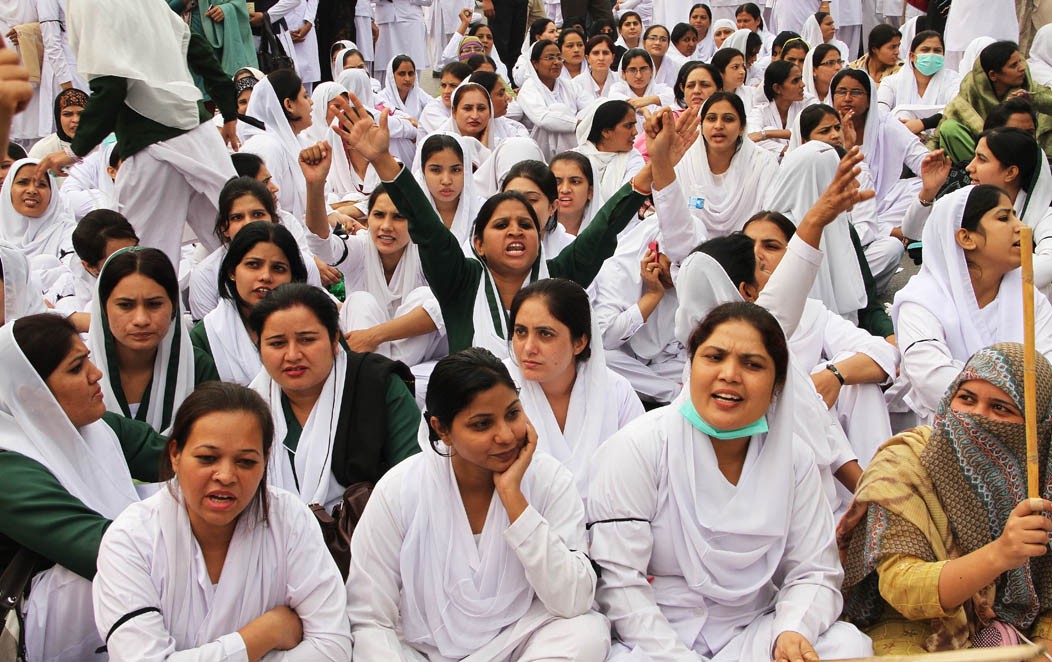
Career planning and incentives for nurses are essential for better healthcare services

The Punjab Health Department currently employs over 100,000 people including management/administrative staff, general cadre workers and specialist staff with a budget allocation of Rs166.16 billion. Harnessing this huge workforce to work cohesively is a major challenge for the department. It is in fact the recruitment and retention of the correct skills that continues to be a challenge for the department.
A nurse employed at BPS-16 is called charge nurse who serves with the government of Punjab as a public servant. Nurses play an extremely important role in healthcare delivery system and patient care. Without their active participation, patient care and public health service is impossible.
According to director general nursing there are about 11065 regular charge nurses and 1489 ad-hoc nurses in Punjab. According to the Pakistan Nursing Council, Punjab requires 19,900 nurses. Our study under the auspices of Center for Public Policy and Governance (CPPG) at Forman Christian College on "Improving Governance: Reforming Provincial Civil Services in Punjab" revealed that several districts in Punjab are facing acute shortage of nurses. Nurses are under staffed, resulting in inadequate patient care.
This was further affirmed through interviews with charge nurses, who fall in BPS-16. This remains as persistent challenge for the government to fill vacant posts and recruit nurses to fill the demand and supply gap. Here two questions merit attention: One regarding state’s responsibility to regulate and monitor the public sector health and; two, its lack of capacity to address the issue of decaying public sector health. Let us focus on the case of nurses whose recruitment, training and career merits attention in this regard.
District Recruitment Committee and Punjab Public Service Commission are recognised as credible and merit-driven bodies responsible for recruitment and transfer of nurses. Yet many claimed that the process is laden with political meddling and not transparent. Ironically, there exists a mismatch between recruitment polices and their implementation practices.
When asked about the problems nurses face in their day-to-day service delivery, many stated that the main issue is shortage of nurses due to which they are overburdened. Secondly, they are not provided with postgraduate allowance, if they wish to improve their qualifications. Lastly, the delay in promotion was also practically seen as the biggest hurdle in their careers. This career stagnation leads to de-motivation. We found an absence of career planning policy for the Basic Pay Scale 5-16, as nurses under this scale interact with citizens on daily basis. The delay in promotion to the higher grade of a charge nurse and non-payment of postgraduate allowance of nurses was seen as an obstacle both in their career and education prospects.
Discussions with technicians, dispensers, and nurses reveal that they had a common theme of using protest as a tool to voice their concerns and demand upgradation in service. Though they are front firefighters delivering immediate public service, they have a haphazard service structure in place and policies that are re-active rather than pro-active.
One of the BPS-16 nurses interviewed said: "Here we serve in hospitals for long hours, but still we can never get the kind of decent pay package." Another nurse who has worked for 16 years in the same position said: "Nurses are the ultimate caretaker of patients, yet they are hardly provided with any refresher courses to upgrade their skills."
According to director general nursing, medical institutions are producing merely 2,500 graduates per year, while the medical colleges are producing 4,000 doctors per year. Moreover, these nursing schools also lack infrastructural facilities. There is acute shortage of hostels for nursing students. A study conducted in four districts of Punjab namely Lahore, Kasur, Sheikhupura and Faisalabad showed nurse-to-patient ratio to be 1:40. Normally, the general nurse-patient ratio is one nurse per 11 patients.
Pakistan Nursing Council is the overseeing body for the curriculum development of nursing diplomas. Now the curriculum has been designed for a 4-year degree programme of nursing. It is a well-defined and comprehensive syllabus. However, this degree programme is currently being offered only in nursing colleges, not in nursing schools.
Based on the findings and outcomes of our study, we recommend streamlining nurses recruitment and transfer process, enhancing nurses training by incorporating a system of follow-up after each training and incorporating refresher courses to determine its utility in practice.
Last but not the least, career planning for nurses is essential for potential and personal growth in public service which can be done by incentivising them through performance-based rewards and time scale promotions.